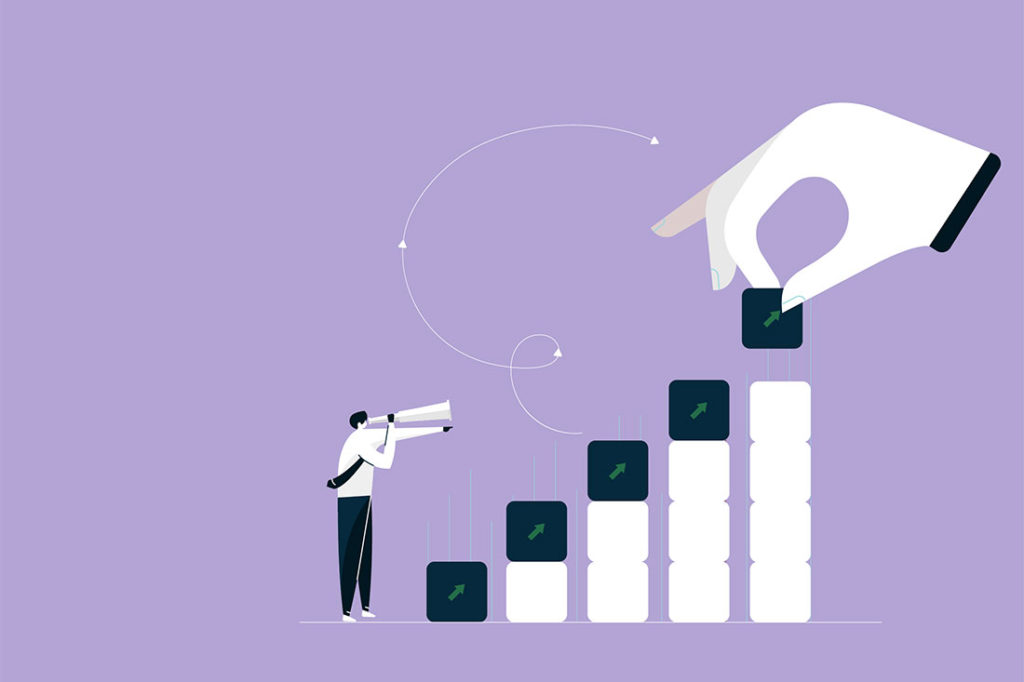2023 Financial Forecast: How to Prepare for the Year Ahead
If it feels like the months are whizzing by, the weeks bleed together and the days feel shorter and shorter, there is actually a little science at play—at least with days. Back in June, scientists reported that Earth had its shortest day since the 1960s, making its full axis turn milliseconds faster than expected.
Admittedly, that’s not much of a time difference, but then again, somehow it’s almost time to bring out the 2023 calendars. And with a new year approaching quickly, it can be a good opportunity to take stock of what’s happened in the past year—in your personal life, career and with your finances—and think about what changes you’d like to make in the year ahead.

Although a trusty crystal ball may help you avoid any pitfalls, there are bound to be both good and bad surprises that await you in 2023. First, some bad news: Experts are cautioning that the year ahead could bring more uncertainty. Now, for the good news: Although there’s bound to be factors that are beyond your control, feeling more confident about your finances can help you navigate whatever comes your way.
What does financial security look like in 2023? We talked with five experts about everything from the economy to the job market to financial markets to find out what to expect. Here’s what they told us.
Get your financial house in order
Just to set things straight, Doug Boneparth isn’t a big believer in New Year’s money-related resolutions. “Just because the earth went around the sun once doesn’t mean anything,” says Boneparth, a certified financial planner and president of Bona Fide Wealth. “No matter what the calendar says, it’s always a great time to focus on the foundational pieces that lead to success.”
That said, a new year can be a good excuse to take a fresh look at your finances—and make some changes, as needed. If you don’t already have a good understanding of how money comes in and out of your life, that should be your No. 1 focus heading into 2023 because so much of managing your personal finances comes down to behavior and establishing good disciplines that you stick with, Boneparth says.
“You need to get a firm understanding of what you’re spending your money on so you can become a disciplined saver or investor,” he says. “If you don’t have a good idea of what those numbers are, then you’re not giving yourself the opportunity to succeed.”
Expect inflation and higher interest rates to stick around
It’s become more difficult in the past year, however, to know what your expenses will be each month—and that makes it all the more challenging to stick to a budget.
Americans increasingly pulled out their credit cards to pay for a whole slew of more-expensive goods and services, which resulted in the biggest surge in credit card debt in more than 20 years. As you think about your personal finances heading into 2023, credit card debt should be top of mind. “It’s important to not take on too much credit card debt,” cautions Megan Horneman, chief investment officer of Verdence Capital Advisors, a financial planning firm.
In the past year, two dynamics in the broader economy have made it especially difficult to stick with a budget and avoid racking up debt. The rate of inflation, or measure of price increases, hit the highest level in more than 40 years in 2022. Meanwhile, after a multi-decade period of low interest rates, it’s now more expensive to borrow money from lenders (such as credit card issuers).
If you’ve found yourself grumbling about higher prices, your days of grumbling may not be over quite yet. Inflation likely peaked in 2022, but will probably come down only gradually in 2023—and may not get back to pre-pandemic levels by year-end, Horneman says. That means you may need to brace for a “new normal” of higher inflation—possibly into 2024, she adds.
That’s because the factors that caused such high inflation in the first place, namely “huge” imbalances between supply and demand, will take some time to work through the global economy, adds Jeffrey Roach, the chief economist of LPL Financial, a brokerage firm. “It’s going to be unlike the ride up,” he says. “The deceleration will take much longer.”
In the backdrop, the Federal Reserve, AKA the central bank of the U.S., has been aggressive in its attempt to temper inflation by ratcheting up interest rates in an effort to cool demand. A major theme that’s likely to continue into the new year is how Fed policymakers will thread the needle of bringing down inflation—but not the overall economy.
Plot smart career moves in a slower economy
Speaking of the economy, forecasting the pace of growth in the year ahead is a bit tricky. It wasn’t a surprise that the economy slowed in 2022 following big gains in 2021—rather, the main question was just how much the pace of growth would slow, notes Luke Tilley, chief economist at Wilmington Trust, which is part of M&T Bank.
What’s different about 2023 is that it’s not so obvious what direction the economy is headed, Tilley says. “Is it going to slow even more or is the economy going to accelerate?”
Given some of the uncertainty about the economy, it’s likely that companies may pull back on hiring. “There’s almost certainly going to be less opportunities for workers next year than there are this year,” Tilley says. In turn, that could mean workers have less bargaining power in negotiating things like raises, he adds. “It’s going to get more challenging next year.”
Companies aren’t likely to pull back on remote work optionality in the year ahead—rather, employers are likely to experiment with finding the right ratio for a hybrid work setup—but there could be a little higher premium on being in the office, notes Roach. Specifically, if you’re worried about the long-term prospects in your current job, this may be a reason to seek out more face-to-face time with your boss and colleagues, he adds.

That said, being in the office isn’t going to necessarily protect you from the risk of being laid off, because that depends more on your industry and role, says AnnElizabeth Konkel, an economist in the Indeed Hiring Lab, which is part of the jobs listing website. Even if the labor market cools, it’s still relatively hot, which means workers are largely in the driver’s seat when navigating their careers, she adds.
But if you do start to get jitters, particularly amid layoff announcements, you may want to think about your career, Konkel advises. “It’s never a bad thing to just ponder: If I was going to get a new job, where would it be and what would I do?” she says. “Even if you don’t take any definitive actions around it, figuring out what’s my plan B, plan C, and plan D, that can go a long way in alleviating anxiety if you’ve worked through some of these scenarios in your head.”
Make wise saving and spending decisions
People naturally get a little nervous about the economy when there’s a lot of chatter about a recession, as there has been in 2022, and when they feel like they increasingly can’t afford everyday purchases. That’s why scenario planning with your personal finances can also be a helpful exercise at any point throughout the year, Konkel says.
In light of a potential slowdown in the economy, you may want to increase the amount of money that you have set aside for an emergency, advises Boneparth. Experts generally recommend that you have an emergency fund that can cover three to six months of living expenses, but “this may be a time when six to nine months may feel more comfortable,” he adds.
And you may want to carefully consider big spending decisions. After two especially hot years for housing, the market cooled considerably in 2022. That doesn’t necessarily mean that there will be a “dramatic” decline in home prices ahead but because mortgage rates have gone up, the home buying equation has changed somewhat, Roach says. “Try to be a discerning home buyer,” he advises. “Don’t enter into the housing market lightly.”
Even as you plot out some of those big money decisions you face in the year ahead, don’t lose track of other goals—namely, retirement. “Think about long-term planning, develop a plan and stick to the plan,” Roach advises. “Don’t think it’s too early to develop a plan to retire; even if you’re at the front end of your career you should develop a plan for the back end.”
Stay invested in financial markets
The path to a comfortable retirement requires you to take a leap of faith in financial markets, and this is arguably where you’ll have to just accept that you don’t have so much control over what happens in the year ahead. Consider 2022: The S&P 500, a benchmark for the U.S. stock market, had its worst six-month start to the year in more than 50 years and fell into a bear market, defined as a decline of at least 20%.
What made that weakness in the stock market all the more frustrating for investors is that it followed a “really good run” the prior three years, notes Tilley. Although he expects the stock market to rebound in the year ahead, uncertainty about the economy does create more uncertainty for financial markets, he adds.
Politics could add to some of the market uncertainty as professional investors try to predict the potential outcome of the 2024 election well in advance. What’s likely to be “a very heated political environment” leading up to November could cause some additional volatility in stock prices, Horneman says.
But history points to at least one favorable trend for investors, Horneman notes. In the year following midterm elections, the U.S. stock market has only declined once since 1935, she says.
No matter whether the market is up or down, it’s important to continue investing so that you can get closer to your long-term goals, such as retirement. And periods of market volatility can actually create opportunities for investors to buy stocks at low prices and benefit from an eventual rebound in prices, Boneparth notes. “This is where you can be very effective at accumulating wealth.”
What financial security looks like in 2023
If all of the above dynamics make you a little nervous, rest assured: It’s always difficult to predict potential pitfalls that await us in any given year. And although the experts here are generally cautious about what to expect, there is always the potential for a surprise and a year that shapes up to look much different come Dec. 31 than it did on Jan. 1.
That’s why a goal should be to ensure that your financial security doesn’t ebb and flow with fluctuations in the broader economy, but rather to take steps to ensure you feel confident about your finances no matter the year on the calendar.
Creating a strong foundation with your personal finances and maintaining discipline—rather than shooting from the hip or guessing at what you’re doing with your money—you also increase your odds of feeling confident in all areas of your life, Boneparth says. “It’s all about being able to deal with volatility in the market, in the economy and in your personal life.”
This article originally appeared in the November/December 2022 issue of SUCCESS magazine. Photos by Shutterstock/APGHEDIA
The post 2023 Financial Forecast: How to Prepare for the Year Ahead appeared first on SUCCESS.
from SUCCESS https://ift.tt/tcSAJZ7
Comments
Post a Comment